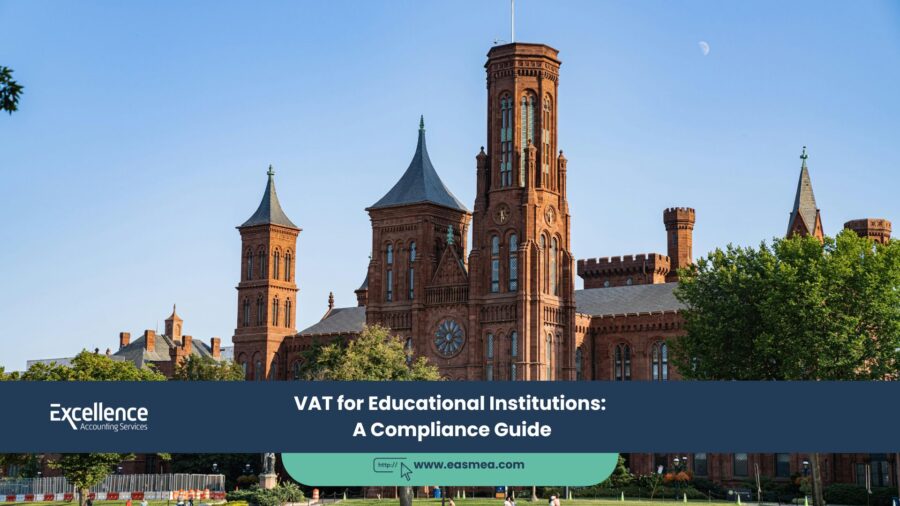VAT for Educational Institutions: A Compliance Guide for the UAE
The UAE has firmly established itself as a global education hub, attracting a diverse student body to its wide array of nurseries, schools, and universities. The government’s strategic focus on developing a knowledge-based economy has placed the education sector in a privileged position. This is reflected in the UAE’s VAT law, which grants a special zero-rating to core educational services, ensuring that tuition remains tax-free for parents and students. However, this preferential treatment does not mean educational institutions are exempt from VAT obligations.
- VAT for Educational Institutions: A Compliance Guide for the UAE
- Part 1: Defining Zero-Rated Educational Services (0% VAT)
- Part 2: Standard-Rated Supplies in Education (5% VAT)
- Part 3: The Challenge of Input Tax Apportionment
- Part 4: Technology and Professional Services
- Specialized VAT & Financial Services for the Education Sector from EAS
- Frequently Asked Questions (FAQs)
- Is Your Institution's Financial Strategy Top of the Class?
In reality, the financial administration of a school or university is a complex tapestry of transactions, many of which fall outside the scope of the zero-rating. The supply of uniforms, transportation, school lunches, and extra-curricular activities are all subject to different VAT rules. This creates a “mixed supply” environment where institutions make both zero-rated and standard-rated supplies, leading to significant challenges in compliance, particularly concerning the recovery of VAT on costs. Mismanaging these complexities can result in penalties from the Federal Tax Authority (FTA) and impact the institution’s financial stability. This guide provides a comprehensive roadmap for bursars, finance managers, and school administrators to navigate the specific VAT landscape for the UAE education sector.
Key VAT Takeaways for the Education Sector
- Core Education is Zero-Rated: Tuition fees for recognized curricula at nurseries, schools, and higher educational institutions are zero-rated (0% VAT).
- Ancillary Supplies are Standard-Rated: Most other supplies, including uniforms, school transport, books, and catering, are subject to 5% VAT if supplied for an additional fee.
- Input Tax Apportionment is Crucial: Institutions must apportion the VAT paid on shared overheads (e.g., building maintenance, utilities) based on the proportion of standard-rated to total supplies.
- Recognition is Key: For the zero-rating to apply, the institution and its curriculum must be recognized by the relevant government entity (e.g., KHDA, ADEK, Ministry of Education).
- Record-Keeping is Paramount: Maintaining clear and distinct records for zero-rated and standard-rated supplies is mandatory for passing an FTA audit.
Part 1: Defining Zero-Rated Educational Services (0% VAT)
The UAE government’s policy is to keep core education services affordable. This is achieved through zero-rating, which means while no tax is charged on the tuition fee, the educational institution can still recover the VAT it pays on its costs related to providing these services.
Conditions for Zero-Rating
For an educational service to be zero-rated, two main conditions must be met:
- The Institution must be a “Qualifying Educational Institution”: This means it must be a nursery, pre-school, elementary school, secondary school, or a higher educational institution (college or university).
- The Institution and its Curriculum must be recognized by the competent Federal or Local Government authority: This includes bodies like the Ministry of Education, the Knowledge and Human Development Authority (KHDA) in Dubai, or the Abu Dhabi Department of Education and Knowledge (ADEK).
If an institution does not meet these criteria (e.g., a vocational training center for a non-recognized curriculum), its services would be subject to the standard 5% VAT rate.
Part 2: Standard-Rated Supplies in Education (5% VAT)
While the core tuition is zero-rated, many other goods and services provided by schools are considered separate supplies and are subject to 5% VAT if a separate charge is made for them.
1. Goods Supplied by the Institution
Goods are only considered part of the zero-rated educational service if they are directly related to the curriculum and are supplied for no extra charge. If a separate fee is charged, the supply is standard-rated.
| Type of Good | VAT Treatment | Reasoning |
|---|---|---|
| School Uniforms | Standard-Rated (5%) | Considered a separate supply of goods, even if mandatory. |
| Stationery & Art Supplies | Standard-Rated (5%) | Charged for separately in the school store. |
| Textbooks & Workbooks | Standard-Rated (5%) | These are separate supplies, distinct from the tuition fee. |
| Electronic Devices (e.g., iPads) | Standard-Rated (5%) | If sold or rented to students for a fee. |
2. Services Supplied by the Institution
Similarly, many services that are supplementary to the core education are standard-rated.
| Type of Service | VAT Treatment | Reasoning |
|---|---|---|
| School Transportation | Standard-Rated (5%) | A separate supply of local passenger transport. |
| Catering / School Meals | Standard-Rated (5%) | A supply of food and beverages. |
| Extra-Curricular Activities (ECAs) | Standard-Rated (5%) | Activities like sports coaching, music lessons, or clubs provided for an additional fee are taxable. |
| School Trips within the UAE | Standard-Rated (5%) | Considered a supply of recreational or educational services for a fee. |
It is critical for schools to have a robust accounting and bookkeeping system that can segregate income from these different streams. This is not just good practice; it is essential for calculating the correct VAT liability.
Part 3: The Challenge of Input Tax Apportionment
This is the most complex VAT compliance area for educational institutions. Because they make both zero-rated supplies (tuition) and standard-rated supplies (uniforms, transport, etc.), they cannot recover 100% of the VAT paid on their shared costs.
Why Apportionment is Needed
Input tax (the VAT you pay on your costs) can only be recovered to the extent that it relates to making “taxable supplies.” Both zero-rated and standard-rated supplies are taxable supplies. However, the legislation requires apportionment when an expense relates to both types. In practice, the FTA expects a fair and reasonable method. The default method is based on the value of supplies.
The Apportionment Calculation Explained
The input tax on overheads must be split between that which is recoverable and that which is not. In the education sector, since both supplies are taxable, 100% of the VAT on overheads is generally recoverable. The real complexity arises if an institution also makes “exempt” supplies, such as providing financial services or renting out residential property. A school renting out teacher accommodation would be making an exempt supply.
Example: School with Exempt Supplies
- Total Revenue in a Tax Period: AED 10,500,000
- Zero-Rated Revenue (Tuition): AED 8,000,000
- Standard-Rated Revenue (Transport, Uniforms): AED 2,000,000
- Exempt Revenue (Residential Rent): AED 500,000
- Total “Taxable Supplies” (Zero + Standard): AED 10,000,000
- Input VAT on Shared Overheads (e.g., campus maintenance): AED 300,000
- Recovery Percentage: (AED 10,000,000 / AED 10,500,000) = 95.2%
- Recoverable Input VAT: AED 300,000 * 95.2% = AED 285,600
The remaining AED 14,400 becomes a cost to the school. This demonstrates why accurate revenue tracking is vital for optimizing VAT recovery.
Part 4: Technology and Professional Services
Managing this level of financial complexity requires powerful tools and expert knowledge.
Platforms like Zoho Books are designed to handle such scenarios. With its powerful tagging and reporting features, it allows finance teams to categorize every income and expense line, automating the segregation of zero-rated, standard-rated, and exempt supplies. This makes the apportionment calculation at the end of each tax period simple, accurate, and fully auditable. A proper accounting system implementation is the first step towards stress-free compliance.
Specialized VAT & Financial Services for the Education Sector from EAS
The unique financial model of educational institutions requires specialized expertise. Excellence Accounting Services provides tailored solutions to help your school or university achieve financial excellence.
- VAT Compliance & Advisory: We provide expert VAT consultancy specifically for schools, helping you classify supplies correctly and optimize your input tax recovery.
- Outsourced Accounting: Let us handle your day-to-day financial operations, from managing accounts receivable for tuition fees to processing accounts payable for suppliers.
- CFO Services: Our CFO services provide strategic financial leadership, helping you with budgeting, cash flow management, and long-term planning.
- Payroll Management: We manage your entire payroll process for teachers and administrative staff, ensuring accuracy and compliance.
- External Audit: Our external audit services provide the assurance that regulators and boards require, delivered with a deep understanding of the education sector.
Frequently Asked Questions (FAQs)
Yes. After-school care provided for an additional fee is considered a separate supply and is subject to 5% VAT. It is not considered part of the core curriculum.
If the school arranges a trip outside the UAE, the services consumed outside the UAE (e.g., hotel, tours abroad) are outside the scope of UAE VAT. The international transport (flights) would be zero-rated. Any administrative fee the school charges for organizing the trip is a standard-rated service.
Yes. The rental of commercial property is a standard-rated supply. You must charge 5% VAT on the rental income you receive.
Generally, yes. These fees are directly related to the provision of the zero-rated educational service and are treated as such. However, if the fee is non-refundable even if the student does not enroll, it could be argued it’s a standard-rated administrative fee. Most institutions treat it as zero-rated.
The VAT treatment follows the nature of the service. Since the tuition is zero-rated, the payment, whether from the parent or a sponsor, relates to a zero-rated supply. No VAT is due. If the scholarship also covers standard-rated items like bus fees, the school must still account for the 5% output VAT on that portion.
If the sports coach is registered for VAT (i.e., their annual turnover exceeds the mandatory threshold), they must charge you 5% VAT on their services. Your school can then recover this input VAT, as it’s a cost related to making standard-rated supplies (the extra-curricular sports activity).
This is a grey area. If the fee is just to cover the cost of the cap and gown rental, it could be a standard-rated supply of goods. If it’s a general fee for participating in the ceremony, which is an integral part of completing the education, it could be argued it’s zero-rated. A conservative approach would be to charge 5% VAT.
If there is no separate charge for the textbooks and they are genuinely part of a single, composite supply of education, then their cost is absorbed into the zero-rated tuition fee. No separate VAT is charged. The VAT you paid when purchasing the books would be recoverable as it relates to making a zero-rated supply.
Yes. A tax invoice must be issued for all taxable supplies, even zero-rated ones. The invoice must meet all the legal requirements but should clearly show a VAT rate of 0% and a total VAT amount of AED 0.00 for the tuition portion.
This is a supply of professional consultancy services. It is not an educational service. Therefore, the income received from this corporate consultancy is subject to the standard 5% rate of VAT.
Conclusion: Excelling in Financial Governance
For educational institutions in the UAE, VAT compliance is a nuanced but manageable discipline. The key lies in understanding the clear distinction between zero-rated core services and standard-rated ancillary supplies. By implementing robust financial systems, maintaining meticulous records, and applying the principles of apportionment correctly, schools and universities can meet their obligations to the FTA while protecting their financial health. This commitment to fiscal responsibility is the bedrock that allows them to focus on their ultimate mission: shaping the next generation of leaders, innovators, and global citizens.




